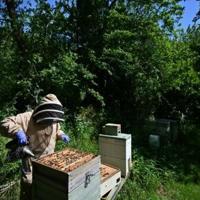Lynne Ingram tends to a row of humming beehives in Somerset, southwest England, embodying a peaceful image.
However, as a master beekeeper with over 40 years of experience, she is currently engaged in a battle against a complex and evolving enemy – honey fraudsters.
While the act of adulterating honey is not new, historically using substances like ash and potato flour, technological and scientific advancements have made it easier than ever to manipulate honey with syrups that can deceive authenticity tests, according to Ingram.
In response, she established the UK Honey Authenticity Network (HAN UK) in 2021 to educate the public about natural honey and the dangers posed by fraud.
She explained, “One of the consequences we’re witnessing globally is beekeepers being driven out of business.”
Adulterated honey can be sold to retailers at a fraction of the cost genuine producers need, leading to potential closures of beekeeping businesses.
Additionally, the loss of beekeepers impacts crop pollination contracts with farmers, affecting food production.
The British Beekeepers Association, representing over 25,000 producers, is concerned about the risks of fraud and aims to safeguard the industry and consumers.
Recent adjustments to honey regulations in the European Union prioritize enhanced product labeling and transparency, while the UK, now independent from the EU, lacks stringent labeling requirements, with vague packaging potentially misleading consumers.
To combat adulterated honey entering the EU, researchers at Aston University in Birmingham are utilizing cutting-edge technology like Fluorescence Excitation-Emission Spectroscopy (FLE) to identify fraudulent honey samples at the molecular level.
This technology could establish a unified standard for testing methods and potentially create a database of honey biometric signatures.
Ultimately, combating honey fraud requires a combined effort from government oversight, technological innovation, and consumer awareness.
video/phz/gil





